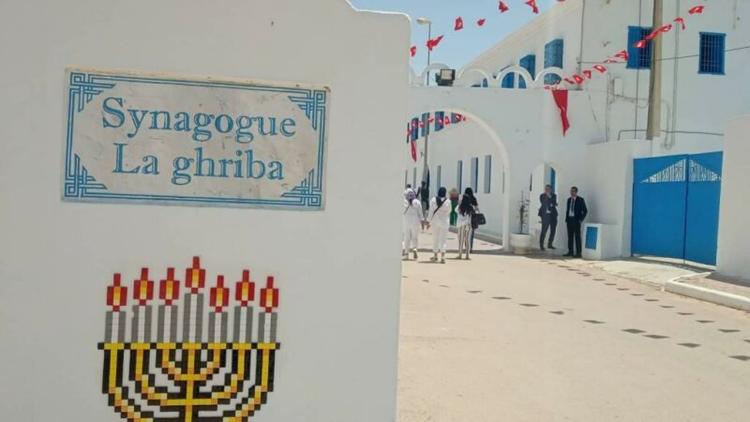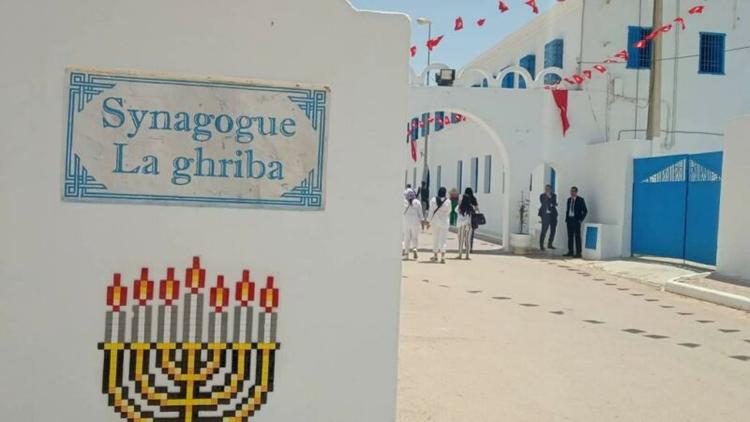By Imen Boudali | Raseef22 | –
This article by Imen Boudali was first published by Raseef22, and is being republished as part of a content-sharing partnership with Global Voices.
( Globalvoices.org ) – In May of each year, Tunisia hosts a unique and extraordinary event. The north African country, home to the oldest synagogue in Africa, celebrates and revives its Jewish roots through the pilgrimage of La Ghriba, an event bringing together different religions on the tranquil island of Djerba.
Home to Africa’s oldest synagogue, Djerba celebrates its Jewish roots annually
As soon as the ferry approaches the coast, Djerba welcomes you with serenity. This island, the historical home of Tunisians of all three major monotheistic faiths and the site of an annual Jewish pilgrimage, is often called the “island of dreams.” It gives visitors a sense of belonging and embraces them like no other place. Palm trees as far as the eye can see, all along the occasionally rudimentary roads, you quickly start seeing Djerba’s signature houses or houche, the island’s small, colourful shops, men in grey jebbas, women in beskris, malhfas (traditional outfits worn only by women of that island) and dhallalas (traditional straw hats) everywhere.
La Ghriba is an event bringing together different religions on the tranquil island of Djerba. Image by Imen Boudali, used with permission.
This scenery is complemented by the smell of the beautiful blue sea, the fishermen and their boats scattered here and there, the vendors of jasmine flower bouquets, the groups of old men playing checkers and the women driving motorbikes. In essence, when you are here, you absorb colours, hues, and shapes, sometimes basic and minimalist, but never dull or wearisome.
But it is not only the heavenly coasts or the incomparable sunsets that make this place unique and beautiful; it’s the people, and, for this, Djerba is not only adored by Tunisians, but by countless visitors from all over the world.
Djerba’s inhabitants have succeeded over the course of the island’s history in maintaining a peaceful coexistence between its Muslim, Christian and Jewish communities that has become exceedingly rare, not just in the Arab region, but also around the world.
Jews of Djerba
Before the creation of Israel in 1948, Tunisia was home to more than 100,000 Jews, but, as years passed, and with the 1967 Arab-Israeli war, many left. However, the country is home to one of the MENA region’s largest Jewish communities with 2,000 Jews, including 1,200 living in Djerba.
To this day, and despite their not very large number, Jewish Tunisians continue to hold an important place in Djerbian society and are, like their non-Jewish neighbors, active in the island’s tourism industry.
Djerba is home to one Jewish school (yeshiva), which offers both secular and religious education for five- and six-year-olds as well as teenagers aged 14 years old. Going through the classrooms, one hears students discussing Torah verses, switching between Tunisian Arabic and the biblical Hebrew of the texts. In another of the island’s schools, Souani Primary School, Muslim and Jewish students study together in the same classrooms, sharing in secular academic pursuit and anchoring the future of their society in principles of inter-religious harmony.
Djerba’s Jewish legacy, as well as the legacy of Tunisia’s religious diversity, is on full display each year during the Ghriba pilgrimage. This annual rendezvous took place this year from May 14 to 22 with various events, including visiting the synagogue, giving alms and doing charity, prayers, and other local traditions.
Non-Jewish Tunisians frequently participate in some of the synagogue’s traditions. For instance, many local women and visitors bring eggs marked with the names of young girls of their families, and leave them in a particular spot at the synagogue. Once the pilgrimage is over, the eggs are taken back to the young girls who then eat them in the hope of boosting their marriage prospects.
A colourful pilgrimage
As you walk towards the synagogue, the security presence is certainly noteworthy. Hundreds of police, special forces and armored vehicles are stationed along the street and around the place of worship to ensure the smooth running of the festivities. Before entering the premises, visitors go through a scanner, and their belongings are thoroughly searched.
When you pass the security apparatus, hundreds of Tunisian flags and the characteristic blue and white of the buildings welcome you.
Music plays in the background. Everyone feels the atmosphere of festivity. Young and old, you can see that everyone dresses in their finest clothing. Under the sun of an April afternoon, groups of visitors flock in festive clothing, quickening their steps to find a seat in the Oukala (a sort of very traditional and cheap hotel in popular Tunisian neighbourhoods) where a music party is organized.
“My mom bought new clothes so I can wear them today. Now I am waiting for my friends to come so we can play together. I am very excited!,” said Ishmail, 8, smiling wholeheartedly alongside his parents and other family members.
Other attendees, more focused on the religious aspect of the event, choose to go directly to the synagogue. Despite its relatively small size, the building’s interior is astoundingly beautiful. The blue earthenware tiles, embracing the four walls up to the ceiling, are striking. The room is teeming with people.
Under the arcades and the eternal lamps, some attendees are seated to read the Torah, others are lighting candles and whispering, discreetly with eyes closed, their long-held wishes.
“I came to deposit this egg in the name of my single niece,” Eliana, a Franco-Tunisian septuagenarian said. “I know she doesn’t really believe in these stories, but since I was little, I used to come to this synagogue and see my mother and my aunts do this. It’s part of our history and our identity, and I’m keeping the heritage alive.”
Touristic relevance, security concerns
This annual pilgrimage is not only important for the local community, but for the whole country, from an economic perspective, through reviving the island’s touristic sector, and politically, since it helps to forge the peaceful and multicultural identity of Tunisia. The event is prepared months in advance, with the participation of various stakeholders, including the Ministry of the Interior — all to avoid any bad surprises.
In recent memory, Tunisia has experienced two tragic attacks on Djerba’s Jewish community. The first was in 1985, when a soldier in charge of maintaining order opened fire inside the Ghriba Synagogue, killing five people. Then, in 2002, a 25-year-old Franco-Tunisian linked to the Al-Qaeda killed 21 people.
With these incidents in mind, the Tunisian authorities sought to make this annual event more secure. Head of Government Najla Bouden, Minister of Tourism Mohamed Moez Belhassine, Governor of Médenine Said Ben Zayed, Chief Rabbi of Tunisia Haïm Bittan, as well as several ambassadors and diplomats from countries like France, Belgium, Germany, Italy and the USA attended the launch of this year’s pilgrimage.
“Djerba remains a melting pot of civilizations and a land of peace and tolerance for all, from which emanates a message of love and peace,” said Bouden.
For his part, Tourism Minister Belhassine said that the pilgrimage of La Ghriba is an important event that kicks off the tourist and summer season and sends multiple messages to the world about peaceful coexistence and tolerance for a better and more open community.
He added that this important event, which, according to him, gathered about 3,000 visitors, 50 journalists and dignitaries from 14 nationalities, is an occasion to not only discover the multi-cultural aspect of the island, but to dive into a rich destination offering endless advantages.
As for the organizers of the pilgrimage, led by Perez Trabelsi (chairman of the Jewish Ghriba Committee and leader of the Jewish community in Djerba), they considered that this year’s visit was exceptional and distinct on several levels. For them, after two years of pandemic, sending a message of peace and coexistence from Tunisia for the rest of the world was crucial in these tumultuous times.
The Bridge features personal essays, commentary, and creative non-fiction that illuminate differences in perception between local and international coverage of news events, from the unique perspective of members of the Global Voices community. Views expressed do not necessarily represent the opinion of the community as a whole. All Posts
By Imen Boudali is a Tunisian journalist who has worked in Tunisia and across the MENA region, contributing in media outlets like Al-Ahram and the Arab Weekly. This article first appeared in Raseef22.




 © 2025 All Rights Reserved
© 2025 All Rights Reserved